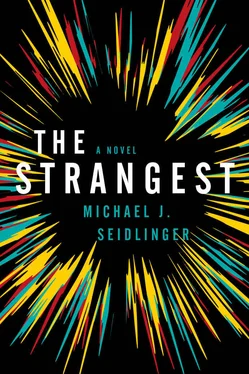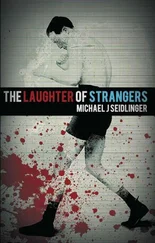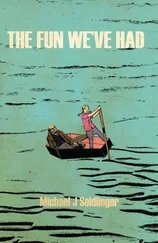Michael Seidlinger - The Strangest
Здесь есть возможность читать онлайн «Michael Seidlinger - The Strangest» весь текст электронной книги совершенно бесплатно (целиком полную версию без сокращений). В некоторых случаях можно слушать аудио, скачать через торрент в формате fb2 и присутствует краткое содержание. Год выпуска: 2015, ISBN: 2015, Издательство: OR Books, Жанр: Современная проза, на английском языке. Описание произведения, (предисловие) а так же отзывы посетителей доступны на портале библиотеки ЛибКат.
- Название:The Strangest
- Автор:
- Издательство:OR Books
- Жанр:
- Год:2015
- ISBN:e9781682190012
- Рейтинг книги:4 / 5. Голосов: 1
-
Избранное:Добавить в избранное
- Отзывы:
-
Ваша оценка:
The Strangest: краткое содержание, описание и аннотация
Предлагаем к чтению аннотацию, описание, краткое содержание или предисловие (зависит от того, что написал сам автор книги «The Strangest»). Если вы не нашли необходимую информацию о книге — напишите в комментариях, мы постараемся отыскать её.
“For a line to exist, it would first have to be crossed.”
"A smart adaptation indeed of a hallowed classic, repositioning it for a grimmer world three-quarters of a century on." "
is a stark and deliberate analysis of life in the 21st Century. Its evaluation of not just social media, but modern presence and its adaptation of what I’ll refer to here as a the new human condition, is, much like Camus’
, authoritative and convincing. Of the string of, or even genre of, contemporary works concentrated on these themes, I found Seidlinger’s
to be, thus far, the most concise and expressive." "[Seidlinger] takes us into the consciousness of a person so withdrawn that he must have some sort of social anxiety disorder; every bit as affectless as Camus’s
, his smartphone is his only lifeline of communication with people, even when they’re right on the subway with him. I like how the author constructs the protagonist’s consciousness, with the integration of social media being elegant and measured, and I particularly like a few pivotal scenes where what is happening is carefully elided by the author — it’s very effective." “Step back Camus, your anti-hero has been fragmented and dispersed via the free-fall of social media. Michael J. Seidlinger’s re-visioning enters the anthropocene without apology or oxygen masks, and asks us to take the trip toward self discovery as if the self was moving particles. A kick-ass ride. A beautiful dismemberment.”
— Lidia Yuknavitch, author of The Small Backs of Children “When I was in high school, I read
in French.
. I was not an A student in French. Maybe a B. Minus. My accent was ‘formidable!’, my grammar and reading comprehension ‘médiocre’. I never looked at that book again, in any language. Now I actually have read Michael Seidlinger’s uniquely compelling
. Am I supposed to now go back read a book of a lesser superlative? This book not only lives up to its title, it does so with impeccable rhythm and a perfectly odd, discomfiting grace befitting of this tale of strangeness updated for our strange present.”
— Elizabeth Crane, author of
“If anyone at any time is in search of a novel that renders the dysphoria and fragmentation experienced by the first generation to live through social media, then he or she should begin with
. Like Camus, Seidlinger does not so much describe anomie as write from it; the result is a strangely resonant book that feels, above all else, honest.”
— Will Chancellor, author of
“
is a bold and stirring portrayal of the alienation of contemporary life, how technology amplifies our desire for approval and magnifies the horror of others’ judgment.”
— Sarah Gerard, author of
“The world that Michael J. Seidlinger navigates in
is one in which the dying battery of a mobile phone provokes more emotion than a dying tree or child, told by a man whose sole value lies in the affirmation of his online persona, each comment and ‘like’ tallied one by one. Not since Seidlinger’s last book have I encountered the chilling terror of Paul Bowles and his dissonant, virtually toneless minimalism, nor the evisceration of contemporary life that Michel Houellebecq delivers, ruthless as a diamond with a broken heart. Camus himself, I think, would affirm this homage to his famous book, with a solemn nod, perhaps, and the crushing underfoot of his last cigarette. For myself, I’m as nauseated as I am lifted, as redeemed as appalled. If you want a vision of life without a soul yoked to one of ways to smash it, step into this void. The lesson is relatively short, but its benefits are sure to go on and on.”
— D. Foy, author of













